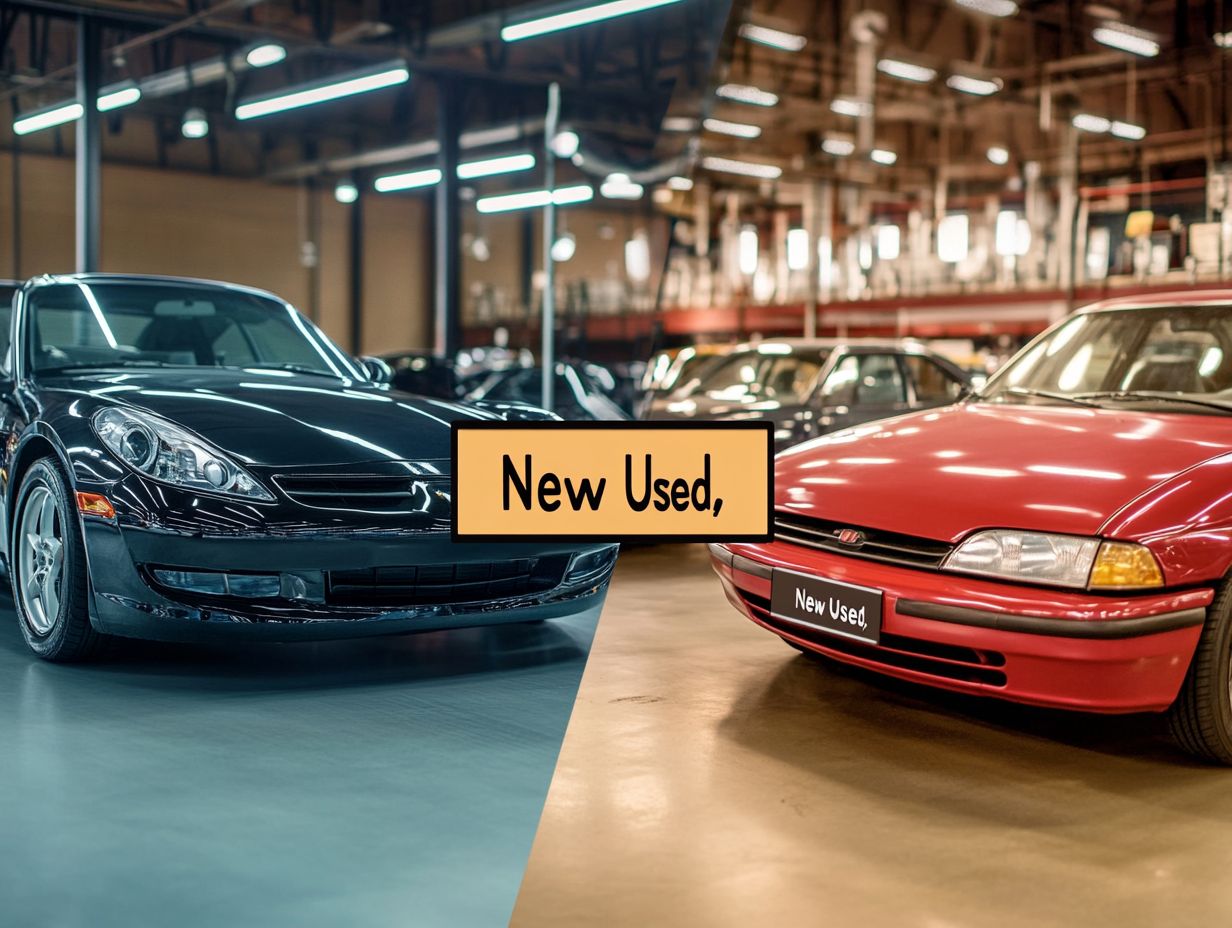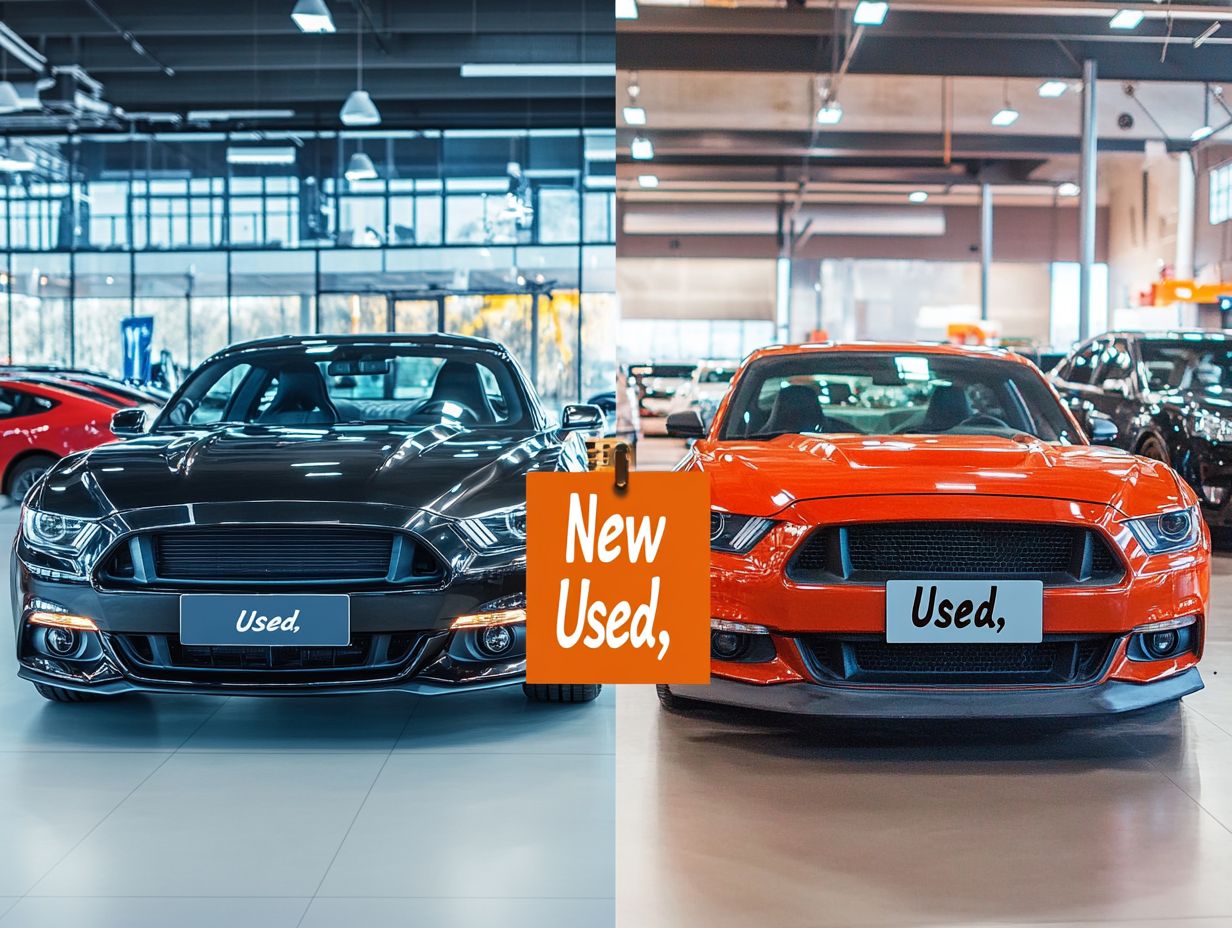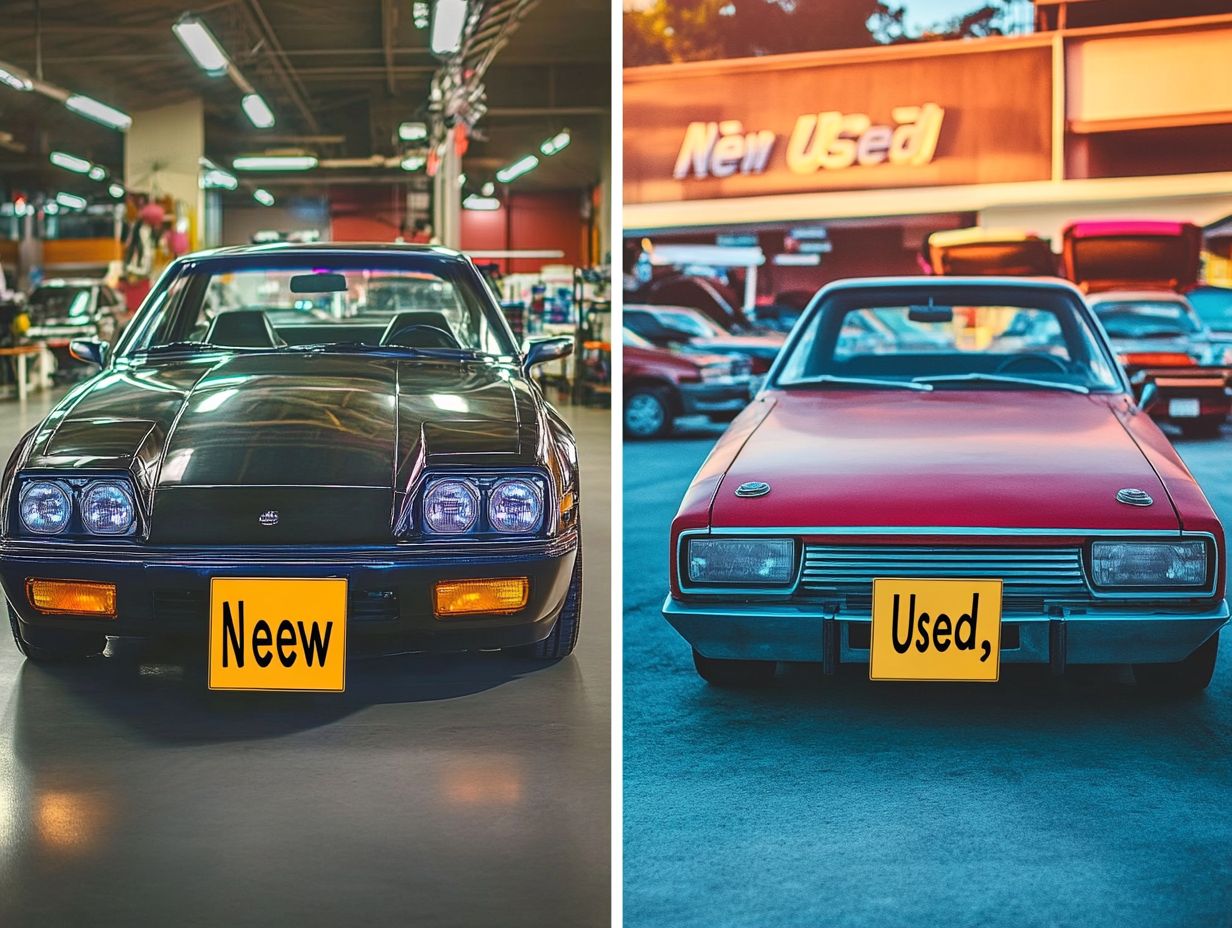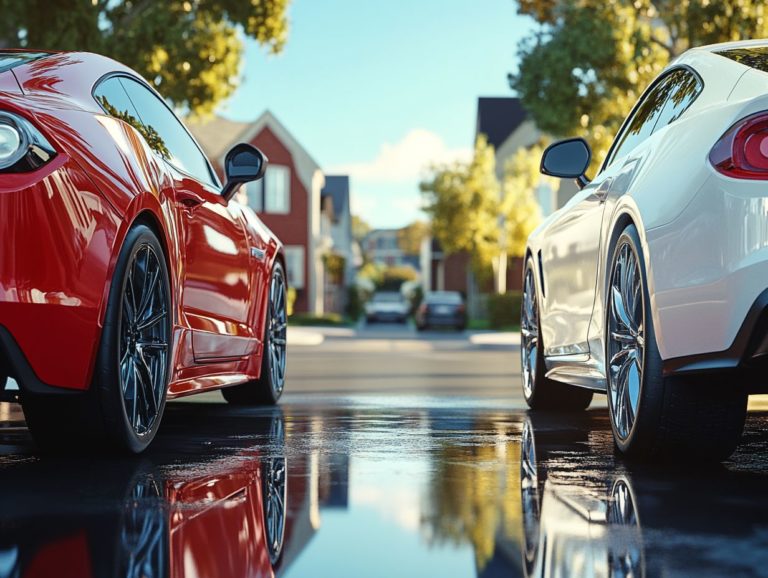The Pros and Cons of Buying New vs. Used
When it comes to purchasing a vehicle, the decision between buying new or used ignites an active discussion. Each option presents its own distinct advantages and disadvantages, tailored to various preferences and budgets.
From the reliability and customization options of new cars to the affordability and diversity offered by used ones, grasping these factors is essential. This article explores the exciting pros and cons of both choices, guiding you through key considerations to empower you in making the best decision for your needs.
Contents
Key Takeaways:

Buying new offers reliability and customization, with the added benefits of warranty and maintenance.
However, the higher cost and depreciation, as well as limited selection, can be drawbacks of buying new.
On the other hand, buying used can be a more affordable option with a wider selection and less depreciation, but it may come with potential hidden issues and lack of warranty and customization.
Overview of the Debate
The debate over whether to buy a new car or a used car involves a range of considerations, including financial implications, maintenance costs, and long-term vehicle value loss. As a car buyer, you ll find yourself balancing the allure of the latest technology in new models with the affordability and potential savings of a used vehicle.
Understanding these factors is crucial for making an informed decision in the automotive market. Beyond the exciting features of new cars, such as advanced entertainment and safety systems, you should also consider critical elements like interest rates on auto loans. These rates can significantly influence your overall expenses.
For instance, current low average rates highlighted by Kelley Blue Book suggest that financing a new vehicle has become increasingly feasible. However, keep in mind that fluctuating loan conditions can make your decision-making process a bit tricky.
You might be drawn to the customization options in newer models, which allow for a personalized driving experience. Pre-owned vehicles often give you a chance to get more car for your money.
Did you know nearly 60% of buyers prioritize safety ratings? Keep this in mind as you make your choice. It highlights the importance of considering both personal preferences and financial realities as you navigate your vehicle selection.
Benefits of Buying New
Investing in a new car presents a wealth of advantages that you simply can’t overlook. With unparalleled reliability, cutting-edge technology, and extensive warranty coverage, it s an enticing option for discerning consumers like yourself.
New cars are typically outfitted with advanced safety features and exceptional performance options, elevating your driving experience while providing peace of mind that every journey is both secure and enjoyable.
Reliability and Customization
One of the standout benefits of purchasing a new car is its reliability, often backed by manufacturer warranties that cover mechanical issues and services for several years. New cars provide extensive customization options, allowing you to tailor your vehicle to fit your specific needs and preferences, from enhanced safety features to sophisticated driver-assistance systems.
This reliability is essential; studies indicate that vehicles backed by comprehensive warranties can significantly lower long-term ownership costs. Regular service intervals recommended by manufacturers promote optimal performance while extending your vehicle’s lifespan.
Today, you can choose from a wide array of customization options, including cutting-edge safety technologies like adaptive cruise control and emergency braking systems.
Take popular models like the Honda CR-V and Toyota RAV4; they offer these safety enhancements as part of their packages. This ensures your vehicle aligns with your personal style while prioritizing safety on the road. By emphasizing both reliability and customization, manufacturers are meeting the evolving demands of modern consumers like you.
In summary, whether you choose new or used, consider your personal needs, budget, and preferences. Make an informed decision that suits you best!
Warranty and Maintenance
New cars come with warranties that cover many mechanical issues. This reduces your maintenance costs significantly during the first few years.
Over time, you can save a lot, especially compared to the unpredictable repairs often faced with used cars. Common tasks like oil changes and tire rotations are typically cheaper for new cars due to less wear and tear.
Industry standards indicate that a new vehicle may incur maintenance costs that are about 20% lower during its warranty period compared to used counterparts. This makes new cars a financially astute choice for many consumers.
Experts agree that the long-term benefits of warranty coverage offer peace of mind. This allows you to budget more effectively for your total vehicle expenses.
Drawbacks of Buying New

A new car is exciting, but it comes with hidden challenges. You ll face a higher upfront cost and rapid vehicle depreciation, both of which can lead to significant financial losses.
Monthly payments for new auto loans can strain your budget. Therefore, it s crucial to assess your financial situation thoughtfully before making this commitment.
Higher Cost and Depreciation
The higher cost of purchasing a new car is a significant drawback, especially considering the rapid depreciation that occurs within the first few years.
New cars typically lose about 20% of their value the moment they leave the dealership. This translates into considerable financial losses for you as a buyer.
For example, if you invest in a vehicle priced at $30,000, its estimated resale value might plummet to around $24,000 after just one year. By the end of its third year, that same car could be worth approximately 50% of its original price, depending on the make and model.
This swift decline directly impacts your long-term financial decisions, especially when considering trade-in values or securing loans against the vehicle. You may end up owing more on the loan than the car is worth, leading to negative equity that complicates future purchases.
By understanding the intricacies of vehicle depreciation, you can make more informed choices. This ensures you grasp not only your immediate costs but also how these factors will influence your financial stability over time.
Limited Selection
One drawback when buying a new car is the often limited selection available. This can restrict your ability to find the exact make and model that aligns with your preferences and needs.
While customization options exist, they may not always match your vision for the ideal vehicle. This limitation becomes especially apparent during peak market trends when popular models vanish from the lot due to surges in consumer demand.
Consequently, you may find yourself settling for a vehicle that lacks the specific features or aesthetics you truly desire.
On the flip side, the used car market offers a much broader array of choices. Here, you can uncover unique finds, such as discontinued models or vintage classics, that cater to your specific tastes and often come with more appealing price points.
Advantages of Buying Used
Opting for a used car presents numerous advantages. Chief among them are notably lower prices and enhanced affordability, making it an appealing choice for many consumers.
Moreover, the availability of comprehensive vehicle history reports via services like Carfax equips you with valuable insights into the car s past, enabling you to make a well-informed purchase decision.
Explore your options today and find the perfect used car for you!
Cheaper Prices and More Options
One of the most compelling reasons to consider buying a used car is the significantly lower prices compared to new vehicles. This allows you to maximize your budget and explore a wealth of options.
By adopting this budget-friendly strategy, you gain access to a diverse array of makes and models without the financial strain that often accompanies new car purchases.
Imagine discovering reliable sedans, compact cars, and even SUVs at various price points, often ranging from just a few thousand to around $20,000. You can discover dependable models that last, like Honda Civics and Toyota RAV4s. These vehicles not only cater to different lifestyles but also fit within varying budgets.
This financial flexibility enables you to make thoughtful decisions. You can weigh your priorities and needs, ensuring that each purchase is more than just a transaction; it’s a meaningful investment in your driving experience.
Less Depreciation

One of the standout benefits of purchasing a used car is the better value retention over time. By opting for a pre-owned vehicle, you re likely to retain more value as it ages.
Used cars have already navigated the steepest decline in value, making them a far more astute investment for those mindful of their financial outlay. Recent studies reveal that new cars can lose as much as 20% of their value within the first year alone, whereas a used car typically depreciates at a more measured pace around 15% over the first three years.
This substantial difference means that discerning buyers like you can secure quality vehicles that have already endured the most significant price drops, thus enhancing your financial advantage. Understanding these trends can significantly influence your decision-making process.
By choosing a used vehicle, you not only benefit from lower monthly payments but also experience reduced financial stress, ultimately leading to an increased sense of satisfaction with your purchase.
Disadvantages of Buying Used
Purchasing a used car offers numerous advantages, but it also comes with notable drawbacks, particularly the risk of hidden issues that may not be visible at first glance.
Many pre-owned vehicles come with limited or no comprehensive warranties, leaving you vulnerable to unexpected mechanical problems and additional repair expenses that could arise later on.
Potential for Hidden Issues
When considering the purchase of a used car, one of your primary concerns should be the potential for hidden issues that might surface post-purchase, resulting in costly repairs and disappointment.
Conducting a thorough vehicle history check allows you to uncover details about previous accidents, maintenance records, and other essential information that might hint at underlying mechanical problems. This proactive approach not only fosters transparency but also provides you with peace of mind, enabling you to make informed decisions.
Used cars often come with the risk of common mechanical issues such as transmission failure, engine troubles, or brake problems that may arise unexpectedly.
By taking the initiative to inspect the vehicle and consult detailed reports like Carfax, you can spot red flags that could indicate future expenses. Being aware of these potential pitfalls enables you to negotiate better prices or even walk away from deals that might lead to unforeseen financial burdens.
Lack of Warranty and Customization
One notable drawback of buying a used car is the often limited warranty coverage on many pre-owned vehicles, which can leave you exposed to unexpected repair costs. While some used cars might provide limited customization options, they generally fall short of the personal touch that new models offer.
This lack of protection can lead to considerable financial strain if major issues crop up shortly after your purchase, prompting you to reevaluate the overall value of used options. The unpredictability of potential repairs may dissuade you, especially if peace of mind is a priority in your investment.
The used car market can have challenges for modifications. Many older models simply aren t compatible with the latest tech and accessories, further narrowing your customization possibilities.
As a result, you might find yourself drawn to new cars, which boast a broader range of features and personalization choices, ultimately influencing your purchasing decision.
Factors to Consider Before Making a Decision
Before you decide whether to invest in a new car or opt for a used one, take your time to evaluate these factors; your choice can impact your finances for years!
Consider your budget, financial situation, and credit score. Understanding car loans and the interest rates that come with them will enable you to choose the most suitable path for your automotive needs.
Budget and Personal Needs

Evaluating your budget and personal needs is a crucial step in the car-buying process, as your financial decisions will significantly influence whether you lean towards a new or used vehicle.
Understanding how each option aligns with your budgetary constraints and lifestyle requirements will empower you to make a more informed and satisfying decision.
It’s essential to dive into your financial landscape, considering factors like monthly payment limits, total loan amounts, and current interest rates. For example, high-interest rates can drastically alter your monthly payments, prompting you to rethink your options.
By comparing financing alternatives and evaluating potential expenses such as insurance, maintenance, and fuel efficiency, you can arrive at a well-founded decision.
Weighing the implications of choosing a new vehicle versus a used one can ensure that your financial habits align with your long-term goals and priorities while addressing your immediate needs.
Frequently Asked Questions
What are the pros of buying a new car?
Buying a new car allows you to customize the vehicle to your preferences and enjoy the latest technology and features. It also typically comes with a warranty and requires less maintenance.
What are the cons of buying a new car?
New cars can be significantly more expensive than used cars, and they can depreciate, which means they decrease in value over time, quickly. They also come with higher insurance and registration costs.
What are the pros of buying a used car?
Used cars are usually more affordable than new cars and can offer a wider variety of options within your budget. They have already gone through the initial depreciation, so they may hold their value better.
What are the cons of buying a used car?
Used cars may have more wear and tear, higher maintenance costs, and may not feature the latest technology. They may also not come with a warranty, leaving you responsible for any repairs.
What should I consider when deciding between buying new vs. used?
When making this decision, consider your budget, the type of car you want, your long-term plans for the vehicle, and your personal preferences. Researching the history and condition of the used car you are interested in is crucial.
Is it better to buy new or used for my first car?
This depends on your individual circumstances and preferences. If you have a limited budget and want to save money, a used car may be a better option. However, if you have the funds and would like a car with the latest features and a warranty, a new car may be a better fit. It’s important to weigh your options and make the best decision for your needs.
Finding the right car can be thrilling! Let’s dive into what you need to know. Start your car search or consult a financial advisor for personalized advice.






